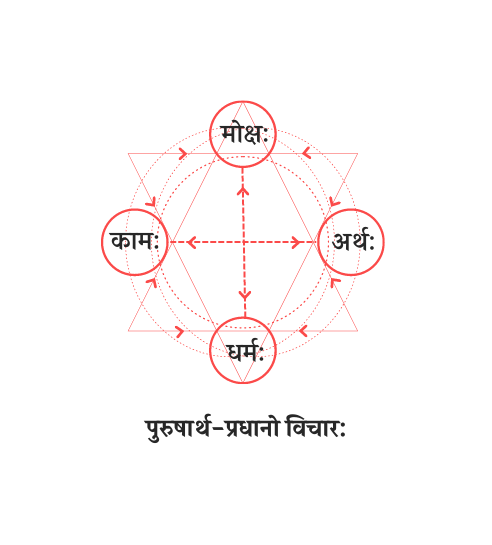The Śāstrika Framework
Bṛhat recognizes our Devabhāsa, Sanskrit, as an intellectual necessity towards any effort to reimagine and reorient the knowledge and disciplines within the IKS framework.
The objective of Bṛhat’s work in the IKS space is to re-conceptualize subjects/disciplines in the following śāstrika framework. The idea is to locate every subject from its conceptualization to its application within the śāstrika frameworks, which were the outcome of the tapas of our Ṛṣis and Acāryas.
Reviving, developing, and popularising indigenous inductive and deductive approaches to knowing, which are anchored in the self-reflexive, self-conscious sociology and anthropology of the Vedas, is another area that needs immediate attention. There is also a need to popularize the work by the likes of GS Ghurye, MN Srinivas, TN Madan, McKim Marriott, Louis Dumont, and Andre Beteille, etc., who developed original sociological concepts for studying Indian society.
Their work now stands marginalized as Indian sociology curricula is increasingly dependent on Marxist and post-marxists imports from the West. In Indian civilization, this task was long performed by our śāstras, which not only identified objects but also provided rules to determine the relationships between them.
सम्बन्ध-निरूपणं शास्त्रस्य कार्यम

The objective of developing an Indic methods of analysis is to propose a new set of instruments that are not ascertained by any other means of cognition (pramāṇa), to obtain results that are not achievable from any other source and which are agreeable to a large set of societal facts. This is especially important because the Indian way of thinking was always concerned about लोकहित, not merely मनुष्यहित (anthropocentric). Also, theory-making within the Indian traditions followed the अनुबंध-चतुष्टय, which includes विषय, फल: (प्रयोजन;), अधिकारी and संबंध:। How can this be integrated into mainstream academia?
When discussing knowledge formation and how epistemologies are given primacy here both Perception and Inference are considered important with Logic, but this is considered superficial up to the point it is combined with meditation and deep reflection ciṃtana and manana. To put it in contemporary vocabulary Indian mind processing has been more hypothetico-deductive methodology than observational inductive methodology. The objective of popularizing IKS is to prepare Indian minds who are rooted in civilizational values of the land. It is to provide an education that “helps the common mass of people to equip themselves for the struggle for life, which does not bring out strength of character, a spirit of philanthropy, and the courage of a lion— is it worthy of the name (Vivekananda, 1987).” The purpose here is the man-making as in a lecture delivered at Los Angeles, California on January 8, 1900, Svāmījī remarked,
“The ideal of all education, all training, should be this man-making. But, instead of that, we are always trying to polish up the outside. What use in polishing up the outside when there is no inside? The end and aim of all training is to make the man grow. The man who influences, who throws his magic, as it were, upon his fellow-beings, is a dynamo of power, and when that man is ready, he can do anything and everything he likes; that personality put upon anything will make it work.”
Realizing the shortcomings of the current education system, the Indian government announced in 2020 a comprehensive policy framework, the National Education Policy, to guide India’s knowledge requirements. The National Education Policy 2020 seeks to restructure the Indian education system around the Indian Knowledge System. It proposes that all curriculum and pedagogy, beginning with the foundational stage, must be redesigned to be deeply rooted in the Indian and local context and ethos in terms of culture, traditions, heritage, customs, language, philosophy, geography, ancient and contemporary knowledge, societal and scientific needs, indigenous and traditional ways of learning, etc.